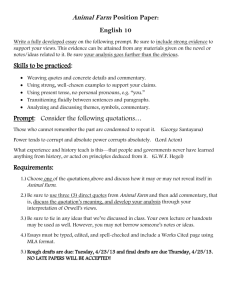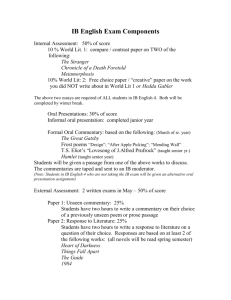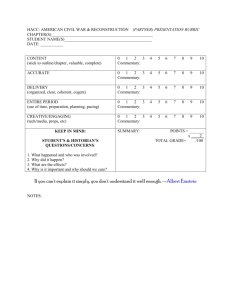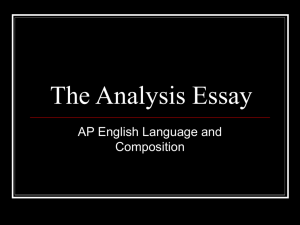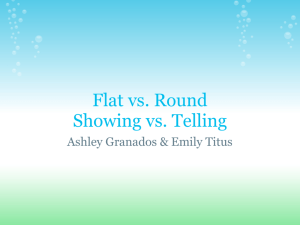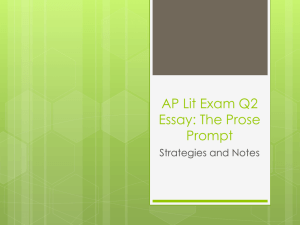Preparing for the IB Exams in English A Guide for the Modern Senior
advertisement
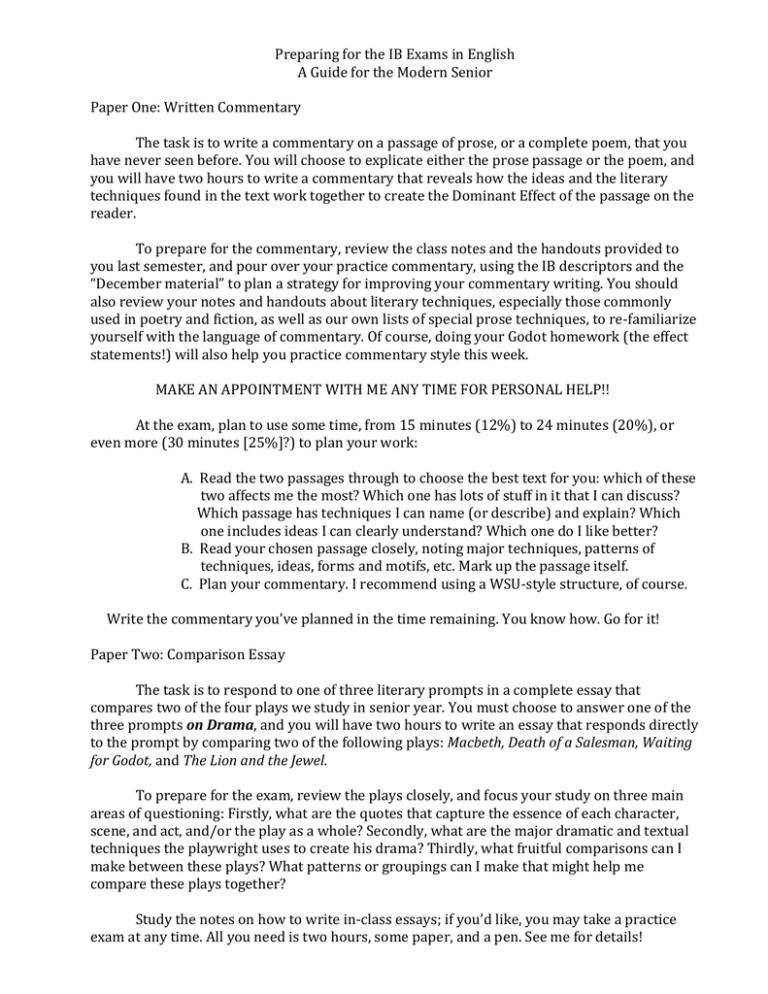
Preparing for the IB Exams in English A Guide for the Modern Senior Paper One: Written Commentary The task is to write a commentary on a passage of prose, or a complete poem, that you have never seen before. You will choose to explicate either the prose passage or the poem, and you will have two hours to write a commentary that reveals how the ideas and the literary techniques found in the text work together to create the Dominant Effect of the passage on the reader. To prepare for the commentary, review the class notes and the handouts provided to you last semester, and pour over your practice commentary, using the IB descriptors and the “December material” to plan a strategy for improving your commentary writing. You should also review your notes and handouts about literary techniques, especially those commonly used in poetry and fiction, as well as our own lists of special prose techniques, to re-familiarize yourself with the language of commentary. Of course, doing your Godot homework (the effect statements!) will also help you practice commentary style this week. MAKE AN APPOINTMENT WITH ME ANY TIME FOR PERSONAL HELP!! At the exam, plan to use some time, from 15 minutes (12%) to 24 minutes (20%), or even more (30 minutes [25%]?) to plan your work: A. Read the two passages through to choose the best text for you: which of these two affects me the most? Which one has lots of stuff in it that I can discuss? Which passage has techniques I can name (or describe) and explain? Which one includes ideas I can clearly understand? Which one do I like better? B. Read your chosen passage closely, noting major techniques, patterns of techniques, ideas, forms and motifs, etc. Mark up the passage itself. C. Plan your commentary. I recommend using a WSU-style structure, of course. Write the commentary you’ve planned in the time remaining. You know how. Go for it! Paper Two: Comparison Essay The task is to respond to one of three literary prompts in a complete essay that compares two of the four plays we study in senior year. You must choose to answer one of the three prompts on Drama, and you will have two hours to write an essay that responds directly to the prompt by comparing two of the following plays: Macbeth, Death of a Salesman, Waiting for Godot, and The Lion and the Jewel. To prepare for the exam, review the plays closely, and focus your study on three main areas of questioning: Firstly, what are the quotes that capture the essence of each character, scene, and act, and/or the play as a whole? Secondly, what are the major dramatic and textual techniques the playwright uses to create his drama? Thirdly, what fruitful comparisons can I make between these plays? What patterns or groupings can I make that might help me compare these plays together? Study the notes on how to write in-class essays; if you’d like, you may take a practice exam at any time. All you need is two hours, some paper, and a pen. See me for details! To do your best on Paper 2, remember the specific nature of the task: ask yourself, “What does IB want from me?” IB WANTS a response that is relevant and focused. IB WANTS a complete essay with a beginning, a middle, and an end. IB WANTS you to respond, prove, and extend your response… just as I do! IB WANTS rhetorical savvy. IB WANTS a slick surface that indicates the potential for real depth. IB WANTS you to show that you know how different writers make different choices of ideas and techniques, of means and effects, NOT a record of what you’ve read this year. IB WANTS you to engage in a double act of persuasion: I know this prompt (I know what it is about) AND I can respond to it, as asked, in a comparative essay. IB WANTS quotes. Lots and lots of quotes (specific references to the text). At the same time, IB WANTS you to support your response to the prompt using those quotes, not just explain them to show that you know what they mean. Finally, I WANT (and, btw, IB WANTS) you to use the names of the playwrights as often as possible: Shakespeare, Miller, Beckett, and Soyinka. After all, it is their choices that you are comparing to respond to the prompt. At the exam, read all three prompts, and respond to whichever prompt you please. Plan your work for 15-20 (or more) minutes, including creating a Thesis that will respond to the prompt directly comparing two of the plays from the “Gang of Four” listed above, and preparing an outline; then write the essay in the time remaining. Good luck!

